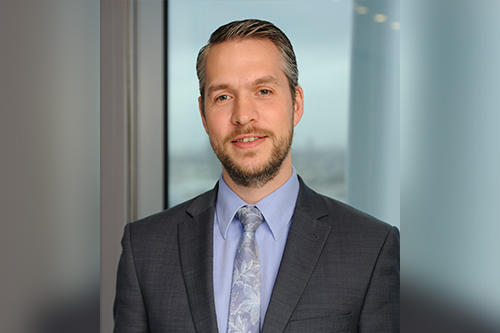

In a recent podcast with Insurance Business, the CEO of Mental Health in Business, Claire Russell highlighted a silent pandemic raging behind the scenes of the insurance industry – that of mental health challenges and its impact on professionals. To draw attention to this issue and to work to establish a benchmark for what constitutes good mental health in the industry, volunteers from across the insurance sector have gathered to establish LikeMind, a market-wide mental health insurance network.
Listen now: IB Talk –Mental Health Awareness
The network, which is co-founded by two insurance professionals, Alexia Eliades (pictured above) of Swiss Re and Tim Woodgett of Liberty Specialty Markets (pictured below), is seeking to create a collective forum to provide mental wellbeing best practices. The initiative had its virtual launch yesterday and saw speakers from a range of businesses including QBE, Marsh and Tokio Marine Kiln provide their insights into some of the main ways individuals can take charge of their mental wellbeing.
Speaking at the event, Eliades outlined how LikeMind was first established when she and Woodgett met at a mental health in insurance event about 18 months ago and identified a gap in the market for a standalone network for mental health.
“We morally felt that that just could not be right,” she said. “While all of our own organisations have mental health committees, we’re still finding from speaking to people in the market that our peers feel uncomfortable in seeking help from their own organisations. And that may be because there is still a stigma, or it may be just because they simply don’t want to talk about personal things with people that they work with every day. So, this is where we hope LikeMind will come in.
“We want to be able to influence and encourage open discussions. We want to champion best practices. We want to create open and shared resources, and potentially provide training for mental health first aiders, but essentially just be an overarching support network for our industry, which we believe is the most responsible thing to do.”
There is a practical cost to simply doing nothing, Eliades noted, and it is essential that people understand the magnitude of this and how it relates to the insurance market. Detailing a recent Deloitte analysis, she highlighted how it is estimated that poor mental health among employees costs the UK employer somewhere between £42 and £46 billion per annum, a rise of about 16% since 2017. For the insurance sector, this mental health crisis costs between £3,242 and £3,353 per employee per year, compared to the national average of £1,652.

Woodgett highlighted that conversations surrounding mental health and wellbeing in the insurance industry essentially come down to the head and the heart. Speaking with people about this subject, he said, he tries to appeal to different groups, whether they are numbers orientated or more interested in the human element of this problem. There is a cost to doing nothing, but this cost also registers on the human side of the equation and it is more important now than maybe ever before to focus on that.
“One of the things that we’ve worked on as part of this launch, and as part of the resources that are available on our site is some standard practices or minimum standards,” he said. “One of the things that I felt when I was first setting up the mental health group within Liberty was [I wanted] to know what does ‘good’ look like? What can I learn from other people? We don’t need to rebuild the wheel.”
LikeMind is looking to provide some basics for those looking to establish how strong mental health support materialises within a business, he said, and what strategies should be in place to implement meaningful change. Businesses and their employees must embrace the business case of taking action, the positive change that mental health first aiders can bring, and the role that culture, environment and signposting play in creating an inclusive environment.
“All [our resources] are there for everyone to use for your own organisation to improve practices around mental health,” he said, “so please, have a look and beg, borrow or steal all of it if you think it’s appropriate for your organisation.”
